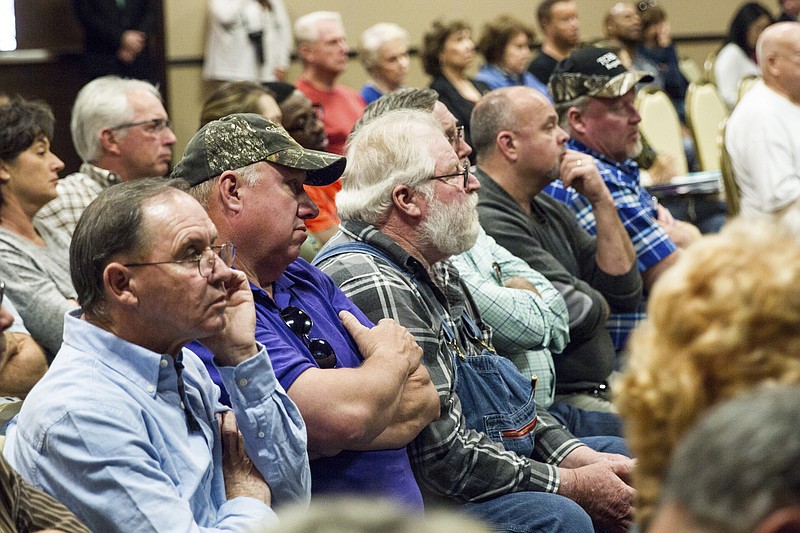ALGOOD, Tenn. (AP) - As Republican Gov. Bill Haslam takes his proposal to boost transportation funding on the road, there is a growing call for his plan to include bigger tax breaks for middle-class drivers who would pay more at the pump under Tennessee's first gas tax hike since 1989.
Haslam traveled to the upper Cumberland Plateau to make his case a day after the first major legislative test of his transportation bill resulted in lawmakers deciding to punt for the week instead of taking it up.
The governor proposes balancing the $280 million per year he would raise for transportation with a series of cuts to other taxes. Although Haslam would reduce the sales tax on groceries, it would not be by nearly as much as he proposes cutting taxes on income from stocks and bonds and taxes owed by large manufacturers.
State lawmakers from both parties are suggesting that may need to change for the measure to start advancing.
At the town hall meeting at the Algood Trinity Assembly on Thursday, Haslam read out some projects that would get underway in Putnam County under his plan, including four roads worth $69 million.
The crowd's response was varied, with the most common concern about how a 7-cent hike on each gallon of gas would affect their budgets.
One audience member noted that rural residents would be disproportionally affected by the gas tax increase because they can't afford to live closer to work. Haslam acknowledged that his administration's estimate of Tennessee drivers paying $4 more per month under his plan wouldn't apply to high-mileage drivers.
"Ultimately you're right, it's going to cost you more than $4 a month," Haslam said. "I can't argue with that. But we have to keep our road system up."
Audience member Joe Woods of Cookeville questioned why the governor is prioritizing transportation funding when other areas like education could use more attention. The new revenue generated under the governor's proposal "puts a lot into the roadbuilders pockets," Woods argued.
Haslam responded that his administration has increased education funding from $3.6 billion to $5 billion during his time in office and that money raised for transportation would go toward tackling a more than $10 billion backlog in road projects, bridge repairs and replacing crumbling pavement in local areas.
Haslam proposes cutting the sales tax on groceries from 5 percent to 4.5 percent - about 50 cents less on $100 of groceries. The change would result in about a $55 million loss in state revenues, compared with a $113 cut in corporate taxes and $102 million in the investment tax.
Each penny of the state's gas tax is worth about $31 million, meaning that Tennessee drivers would be paying about $217 million more per year on gas under Haslam's 7-cent plan.
State Rep. John Mark Windle, a Democrat from about 15 miles northeast of Algood, tried during this week's committee meeting to add a provision to eliminate the state sales tax on baby formula. The proposal was rejected before the committee adjourned.
"I'm not against tax breaks for business," he said after Haslam's town hall meeting. "But we also need to take look at what happens to people who are trying to raise a family and trying to make ends meet."
House Republican Caucus Chairman Ryan Williams of neighboring Cookeville said many in the GOP want to the tax cuts for middle- and lower-income Tennesseans to be "deeper than the user fee increase."
Haslam told reporters after the town hall that the state's strong economic position would allow for deeper tax cuts, but he warned that a future downturn would put finances in a tight spot.
"We're in good shape; I could cut the heck of things now," Haslam said. "I just think that when the economy cycles back down ... I don't want to leave the state in a position where they're going , 'Oh-oh, we're going to raise taxes.'
"I don't think anybody wants to be back there."
